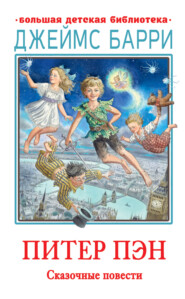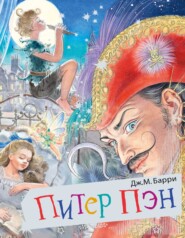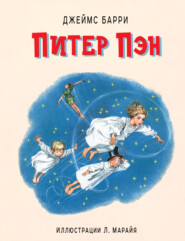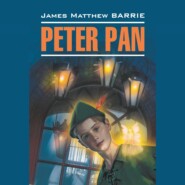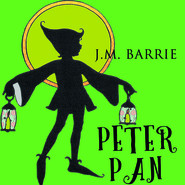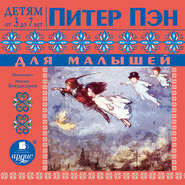По всем вопросам обращайтесь на: info@litportal.ru
(©) 2003-2025.
✖
The Little Minister
Настройки чтения
Размер шрифта
Высота строк
Поля
“You will go to the Spittal for me?” he implored.
“I will not,” I told him. “You are asking me to fling away my life.”
To prove my words I opened the door, and he saw what the flood was doing. Nevertheless, he rose and tottered several times across the room, trying to revive his strength. Though every bit of him was aching, I saw that he would make the attempt.
“Listen to me,” I said. “Lord Rintoul can maintain with some reason that it was you rather than he who abducted Babbie. Nevertheless, there will not, I am convinced, be any marriage at the Spittal to-day. When he carried her off from the Toad’s-hole, he acted under impulses not dissimilar to those that took you to it. Then, I doubt not, he thought possession was all the law, but that scene on the hill has staggered him by this morning. Even though she thinks to save you by marrying him, he will defer his wedding until he learns the import of yours.”
I did not believe in my own reasoning, but I would have said anything to detain him until that cannon was fired. He seemed to read my purpose, for he pushed my arguments from him with his hands, and continued to walk painfully to and fro.
“To defer the wedding,” he said, “would be to tell all his friends of her gypsy origin, and of me. He will risk much to avoid that.”
“In any case,” I answered, “you must now give some thought to those you have forgotten, your mother and your church.”
“That must come afterwards,” he said firmly. “My first duty is to my wife.”
The door swung to sharply just then, and he started. He thought it was the cannon.
“I wish to God it had been!” I cried, interpreting his thoughts.
“Why do you wish me ill?” he asked.
“Mr. Dishart,” I said solemnly, rising and facing him, and disregarding his question, “if that woman is to be your wife, it will be at a cost you cannot estimate till you return to Thrums. Do you think that if your congregation knew of this gypsy marriage they would have you for their minister for another day? Do you enjoy the prospect of taking one who might be an earl’s wife into poverty – ay, and disgraceful poverty? Do you know your mother so little as to think she could survive your shame? Let me warn you, sir, of what I see. I see another minister in the Auld Licht kirk, I see you and your wife stoned through our wynds, stoned from Thrums, as malefactors have been chased out of it ere now; and as certainly as I see these things I see a hearse standing at the manse door, and stern men denying a son’s right to help to carry his mother’s coffin to it. Go your way, sir; but first count the cost.”
His face quivered before these blows, but all he said was, “I must dree my dreed.”
“God is merciful,” I went on, “and these things need not be. He is more merciful to you, sir, than to some, for the storm that He sent to save you is ruining them. And yet the farmers are to-day thanking Him for every pound of wool, every blade of corn He has left them, while you turn from Him because He would save you, not in your way, but in His. It was His hand that stayed your marriage. He meant Babbie for the earl; and if it is on her part a loveless match, she only suffers for her own sins. Of that scene on the hill no one in Thrums, or in the glen, need ever know. Rintoul will see to it that the gypsies vanish from these parts forever, and you may be sure the Spittal will soon be shut up. He and McKenzie have as much reason as yourself to be silent. You, sir, must go back to your congregation, who have heard as yet only vague rumors that your presence will dispel. Even your mother will remain ignorant of what has happened. Your absence from the prayer-meeting you can leave to me to explain.”
He was so silent that I thought him mine, but his first words undeceived me.
“I thought I had nowhere so keen a friend,” he said; “but, Mr. Ogilvy, it is devil’s work you are pleading. Am I to return to my people to act a living lie before them to the end of my days? Do you really think that God devastated a glen to give me a chance of becoming a villain? No, sir, I am in His hands, and I will do what I think right.”
“You will be dishonored,” I said, “in the sight of God and man.”
“Not in God’s sight,” he replied. “It was a sinless marriage, Mr. Ogilvy, and I do not regret it. God ordained that she and I should love each other, and He put it into my power to save her from that man. I took her as my wife before Him, and in His eyes I am her husband. Knowing that, sir, how could I return to Thrums without her?”
I had no answer ready for him. I knew that in my grief for Margaret I had been advocating an unworthy course, but I would not say so. I went gloomily to the door, and there, presently, his hand fell on my shoulder.
“Your advice came too late, at any rate,” he said. “You forget that the precentor was on the hill and saw everything.”
It was he who had forgotten to tell me this, and to me it was the most direful news of all.
“My God!” I cried. “He will have gone to your mother and told her.” And straightway I began to lace my boots.
“Where are you going?” he asked, staring at me.
“To Thrums,” I answered harshly.
“You said that to venture out into the glen was to court death,” he reminded me.
“What of that?” I said, and hastily put on my coat.
“Mr. Ogilvy,” he cried, “I will not allow you to do this for me.”
“For you?” I said bitterly. “It is not for you.”
I would have gone at once, but he got in front of me, asking, “Did you ever know my mother?”
“Long ago,” I answered shortly, and he said no more, thinking, I suppose, that he knew all. He limped to the door with me, and I had only advanced a few steps when I understood better than before what were the dangers I was to venture into. Since I spoke to Waster Lunny the river had risen several feet, and even the hillocks in his turnip-field were now submerged. The mist was creeping down the hills. But what warned me most sharply that the flood was not satisfied yet was the top of the school-house dike; it was lined with field-mice. I turned back, and Gavin, mistaking my meaning, said I did wisely.
“I have not changed my mind,” I told him, and then had some difficulty in continuing. “I expect,” I said, “to reach Thrums safely, even though I should be 297 caught in the mist, but I shall have to go round by the Kelpie brig in order to get across the river, and it is possible that – that something may befall me.”
I have all my life been something of a coward, and my voice shook when I said this, so that Gavin again entreated me to remain at the school-house, saying that if I did not he would accompany me.
“And so increase my danger tenfold?” I pointed out. “No, no, Mr. Dishart, I go alone; and if I can do nothing with the congregation, I can at least send your mother word that you still live. But if anything should happen to me, I want you – ”
But I could not say what I had come back to say. I had meant to ask him, in the event of my death, to take a hundred pounds which were the savings of my life; but now I saw that this might lead to Margaret’s hearing of me, and so I stayed my words. It was bitter to me this, and yet, after all, a little thing when put beside the rest.
“Good-by, Mr. Dishart,” I said abruptly. I then looked at my desk, which contained some trifles that were once Margaret’s. “Should anything happen to me,” I said, “I want that old desk to be destroyed unopened.”
“Mr. Ogilvy,” he answered gently, “you are venturing this because you loved my mother. If anything does befall you, be assured that I will tell her what you attempted for her sake.”
I believe he thought it was to make some such request that I had turned back.
“You must tell her nothing about me,” I exclaimed, in consternation. “Swear that my name will never cross your lips before her. No, that is not enough. You must forget me utterly, whether I live or die, lest some time you should think of me and she should read your thoughts. Swear, man!”
“Must this be?” he said, gazing at me.
“Yes,” I answered more calmly, “it must be. For nearly a score of years I have been blotted out of your mother’s life, and since she came to Thrums my one care has been to keep my existence from her. I have changed my burying-ground even from Thrums to the glen, lest I should die before her, and she, seeing the hearse go by the Tenements, might ask, ‘Whose funeral is this?’”
In my anxiety to warn him, I had said too much. His face grew haggard, and there was fear to speak on it; and I saw, I knew, that some damnable suspicion of Margaret —
“She was my wife!” I cried sharply. “We were married by the minister of Harvie. You are my son.”
Chapter Thirty-Six.
STORY OF THE DOMINIE
When I spoke next, I was back in the school-house, sitting there with my bonnet on my head, Gavin looking at me. We had forgotten the cannon at last.
In that chair I had anticipated this scene more than once of late. I had seen that a time might come when Gavin would have to be told all, and I had even said the words aloud, as if he were indeed opposite me. So now I was only repeating the tale, and I could tell it without emotion, because it was nigh nineteen years old; and I did not look at Gavin, for I knew that his manner of taking it could bring no change to me.
“Did you never ask your mother,” I said, addressing the fire rather than him, “why you were called Gavin?”
“Yes,” he answered, “it was because she thought Gavin a prettier name than Adam.”
“No,” I said slowly, “it was because Gavin is my name. You were called after your father. Do you not remember my taking you one day to the shore at Harvie to see the fishermen carried to their boats upon their wives’ backs, that they might start dry on their journey?”
“No,” he had to reply. “I remember the women carrying the men through the water to the boats, but I thought it was my father who – I mean – ”
“I will not,” I told him. “You are asking me to fling away my life.”
To prove my words I opened the door, and he saw what the flood was doing. Nevertheless, he rose and tottered several times across the room, trying to revive his strength. Though every bit of him was aching, I saw that he would make the attempt.
“Listen to me,” I said. “Lord Rintoul can maintain with some reason that it was you rather than he who abducted Babbie. Nevertheless, there will not, I am convinced, be any marriage at the Spittal to-day. When he carried her off from the Toad’s-hole, he acted under impulses not dissimilar to those that took you to it. Then, I doubt not, he thought possession was all the law, but that scene on the hill has staggered him by this morning. Even though she thinks to save you by marrying him, he will defer his wedding until he learns the import of yours.”
I did not believe in my own reasoning, but I would have said anything to detain him until that cannon was fired. He seemed to read my purpose, for he pushed my arguments from him with his hands, and continued to walk painfully to and fro.
“To defer the wedding,” he said, “would be to tell all his friends of her gypsy origin, and of me. He will risk much to avoid that.”
“In any case,” I answered, “you must now give some thought to those you have forgotten, your mother and your church.”
“That must come afterwards,” he said firmly. “My first duty is to my wife.”
The door swung to sharply just then, and he started. He thought it was the cannon.
“I wish to God it had been!” I cried, interpreting his thoughts.
“Why do you wish me ill?” he asked.
“Mr. Dishart,” I said solemnly, rising and facing him, and disregarding his question, “if that woman is to be your wife, it will be at a cost you cannot estimate till you return to Thrums. Do you think that if your congregation knew of this gypsy marriage they would have you for their minister for another day? Do you enjoy the prospect of taking one who might be an earl’s wife into poverty – ay, and disgraceful poverty? Do you know your mother so little as to think she could survive your shame? Let me warn you, sir, of what I see. I see another minister in the Auld Licht kirk, I see you and your wife stoned through our wynds, stoned from Thrums, as malefactors have been chased out of it ere now; and as certainly as I see these things I see a hearse standing at the manse door, and stern men denying a son’s right to help to carry his mother’s coffin to it. Go your way, sir; but first count the cost.”
His face quivered before these blows, but all he said was, “I must dree my dreed.”
“God is merciful,” I went on, “and these things need not be. He is more merciful to you, sir, than to some, for the storm that He sent to save you is ruining them. And yet the farmers are to-day thanking Him for every pound of wool, every blade of corn He has left them, while you turn from Him because He would save you, not in your way, but in His. It was His hand that stayed your marriage. He meant Babbie for the earl; and if it is on her part a loveless match, she only suffers for her own sins. Of that scene on the hill no one in Thrums, or in the glen, need ever know. Rintoul will see to it that the gypsies vanish from these parts forever, and you may be sure the Spittal will soon be shut up. He and McKenzie have as much reason as yourself to be silent. You, sir, must go back to your congregation, who have heard as yet only vague rumors that your presence will dispel. Even your mother will remain ignorant of what has happened. Your absence from the prayer-meeting you can leave to me to explain.”
He was so silent that I thought him mine, but his first words undeceived me.
“I thought I had nowhere so keen a friend,” he said; “but, Mr. Ogilvy, it is devil’s work you are pleading. Am I to return to my people to act a living lie before them to the end of my days? Do you really think that God devastated a glen to give me a chance of becoming a villain? No, sir, I am in His hands, and I will do what I think right.”
“You will be dishonored,” I said, “in the sight of God and man.”
“Not in God’s sight,” he replied. “It was a sinless marriage, Mr. Ogilvy, and I do not regret it. God ordained that she and I should love each other, and He put it into my power to save her from that man. I took her as my wife before Him, and in His eyes I am her husband. Knowing that, sir, how could I return to Thrums without her?”
I had no answer ready for him. I knew that in my grief for Margaret I had been advocating an unworthy course, but I would not say so. I went gloomily to the door, and there, presently, his hand fell on my shoulder.
“Your advice came too late, at any rate,” he said. “You forget that the precentor was on the hill and saw everything.”
It was he who had forgotten to tell me this, and to me it was the most direful news of all.
“My God!” I cried. “He will have gone to your mother and told her.” And straightway I began to lace my boots.
“Where are you going?” he asked, staring at me.
“To Thrums,” I answered harshly.
“You said that to venture out into the glen was to court death,” he reminded me.
“What of that?” I said, and hastily put on my coat.
“Mr. Ogilvy,” he cried, “I will not allow you to do this for me.”
“For you?” I said bitterly. “It is not for you.”
I would have gone at once, but he got in front of me, asking, “Did you ever know my mother?”
“Long ago,” I answered shortly, and he said no more, thinking, I suppose, that he knew all. He limped to the door with me, and I had only advanced a few steps when I understood better than before what were the dangers I was to venture into. Since I spoke to Waster Lunny the river had risen several feet, and even the hillocks in his turnip-field were now submerged. The mist was creeping down the hills. But what warned me most sharply that the flood was not satisfied yet was the top of the school-house dike; it was lined with field-mice. I turned back, and Gavin, mistaking my meaning, said I did wisely.
“I have not changed my mind,” I told him, and then had some difficulty in continuing. “I expect,” I said, “to reach Thrums safely, even though I should be 297 caught in the mist, but I shall have to go round by the Kelpie brig in order to get across the river, and it is possible that – that something may befall me.”
I have all my life been something of a coward, and my voice shook when I said this, so that Gavin again entreated me to remain at the school-house, saying that if I did not he would accompany me.
“And so increase my danger tenfold?” I pointed out. “No, no, Mr. Dishart, I go alone; and if I can do nothing with the congregation, I can at least send your mother word that you still live. But if anything should happen to me, I want you – ”
But I could not say what I had come back to say. I had meant to ask him, in the event of my death, to take a hundred pounds which were the savings of my life; but now I saw that this might lead to Margaret’s hearing of me, and so I stayed my words. It was bitter to me this, and yet, after all, a little thing when put beside the rest.
“Good-by, Mr. Dishart,” I said abruptly. I then looked at my desk, which contained some trifles that were once Margaret’s. “Should anything happen to me,” I said, “I want that old desk to be destroyed unopened.”
“Mr. Ogilvy,” he answered gently, “you are venturing this because you loved my mother. If anything does befall you, be assured that I will tell her what you attempted for her sake.”
I believe he thought it was to make some such request that I had turned back.
“You must tell her nothing about me,” I exclaimed, in consternation. “Swear that my name will never cross your lips before her. No, that is not enough. You must forget me utterly, whether I live or die, lest some time you should think of me and she should read your thoughts. Swear, man!”
“Must this be?” he said, gazing at me.
“Yes,” I answered more calmly, “it must be. For nearly a score of years I have been blotted out of your mother’s life, and since she came to Thrums my one care has been to keep my existence from her. I have changed my burying-ground even from Thrums to the glen, lest I should die before her, and she, seeing the hearse go by the Tenements, might ask, ‘Whose funeral is this?’”
In my anxiety to warn him, I had said too much. His face grew haggard, and there was fear to speak on it; and I saw, I knew, that some damnable suspicion of Margaret —
“She was my wife!” I cried sharply. “We were married by the minister of Harvie. You are my son.”
Chapter Thirty-Six.
STORY OF THE DOMINIE
When I spoke next, I was back in the school-house, sitting there with my bonnet on my head, Gavin looking at me. We had forgotten the cannon at last.
In that chair I had anticipated this scene more than once of late. I had seen that a time might come when Gavin would have to be told all, and I had even said the words aloud, as if he were indeed opposite me. So now I was only repeating the tale, and I could tell it without emotion, because it was nigh nineteen years old; and I did not look at Gavin, for I knew that his manner of taking it could bring no change to me.
“Did you never ask your mother,” I said, addressing the fire rather than him, “why you were called Gavin?”
“Yes,” he answered, “it was because she thought Gavin a prettier name than Adam.”
“No,” I said slowly, “it was because Gavin is my name. You were called after your father. Do you not remember my taking you one day to the shore at Harvie to see the fishermen carried to their boats upon their wives’ backs, that they might start dry on their journey?”
“No,” he had to reply. “I remember the women carrying the men through the water to the boats, but I thought it was my father who – I mean – ”









